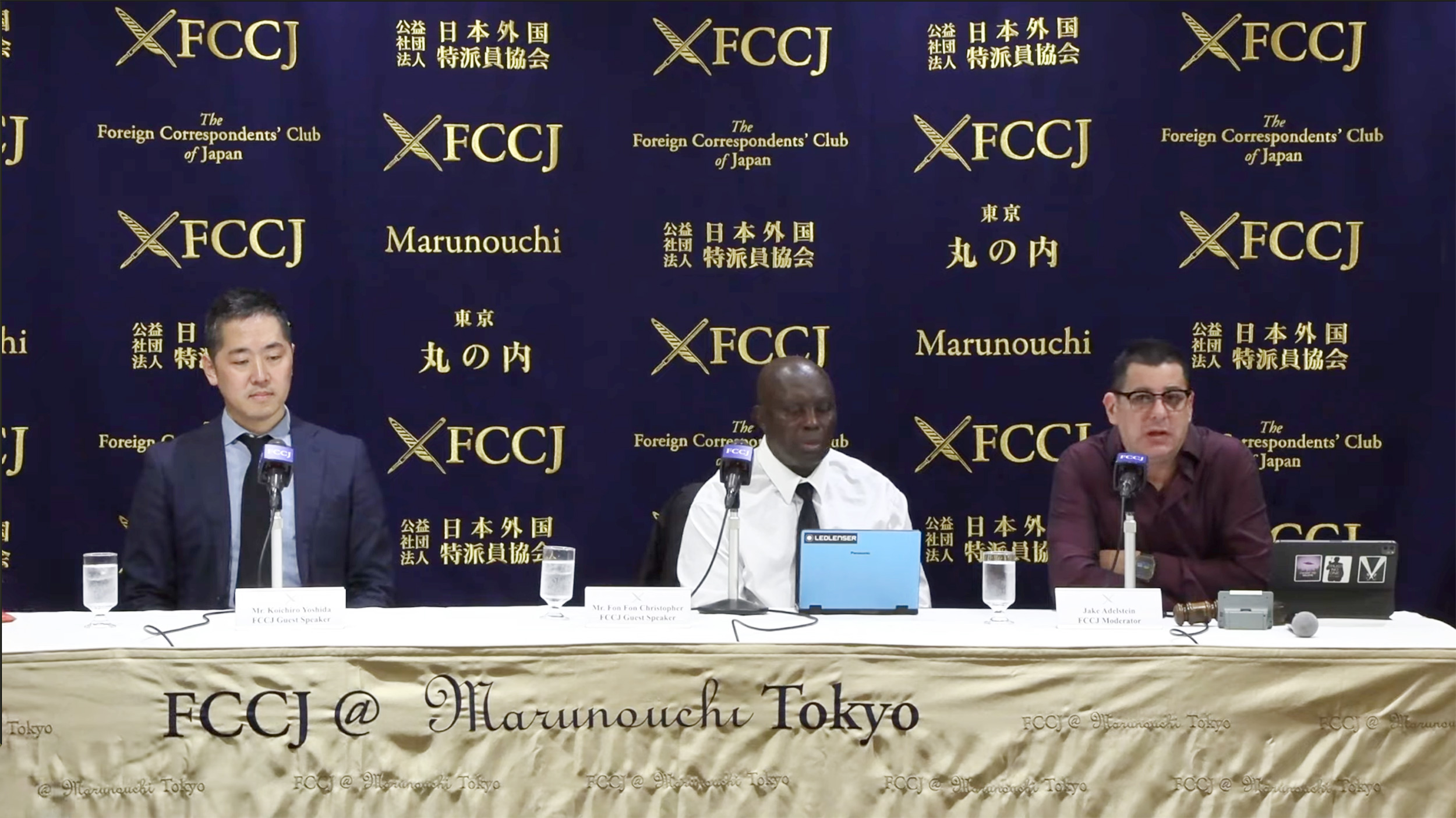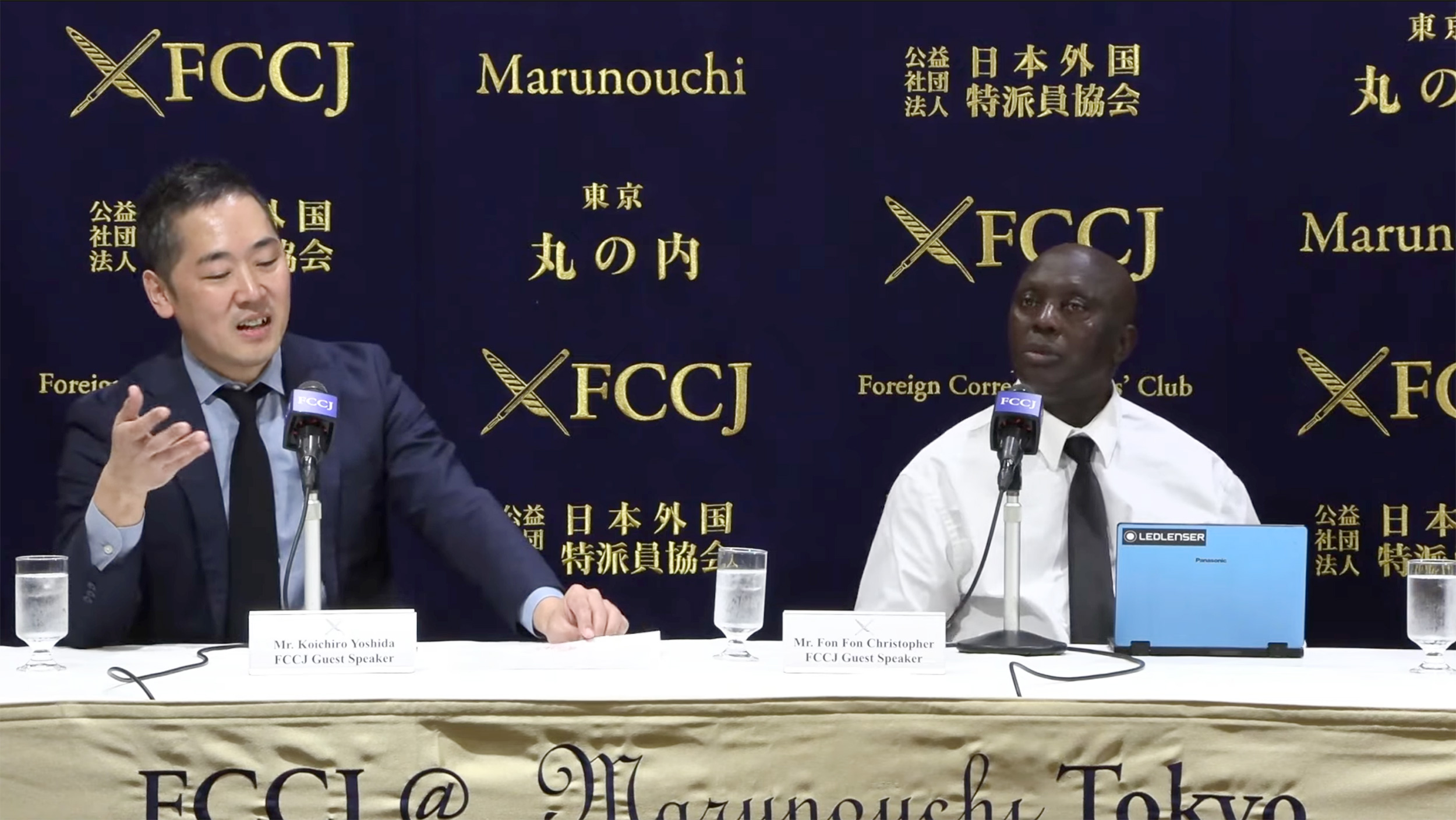Issue:
March 2024
Cameroonian man’s long struggle for recognition exposes faults in Japan’s refugee system

On February 7, the Tokyo High Court delivered its judgment on the longstanding case of Fon Fon Christopher, a former trade union activist and political party member from Cameroon. The court overturned a previous district court ruling and denied his application for refugee status.
Christopher, who has spent almost 10 years campaigning to remain in Japan as a refugee, described the high court’s ruling as flawed and discriminatory and said he would appeal to the Supreme Court.
His case is typical of the struggle many people face to be recognised as refugees by Japan’s government.
An estimated 117.2 million people were forcibly displaced or stateless due to conflicts, climate change, poverty, and other factors in 2023, according to the United Nations.
These global crises have propelled immigration to the heart of debates among policymakers in countries such as the U.S., which is trying to address the influx of migrants at the country's border with Mexico.
Japan, meanwhile, has been criticized for accepting only a tiny number of asylum seekers and for mistreating those who find themselves stuck in the country’s legal system.
Of 3,772 applications for refugee status in Japan in 2022, just 202 were accepted – an approval rate of 5%, but still a record high. The average screening period for applicants lasts 33 months, but those who appeal their case can wait a total of four years.
If their applications are rejected, asylum seekers receive little or no support by the government and are prohibited from working. Christopher, 61, has not been able to work for six years.
Without the connections or money to afford legal assistance, applicants are left to suffer alone. Even those who win their legal battles are not awarded damages.

In addition, cases involving asylum seekers are treated in the same way as regular civil cases, according to Christopher’s attorney, Koichiro Yoshida. This means the very high burden of proof is placed solely on the applicant.
A reform of the refugee law passed by the Diet last year allows the government to deport asylum seekers who make more than two applications for refugee status. The amendments were criticized by U.N. human rights experts.
The first legal definition of refugee status came with the U.N. Refugee Convention of 1951. That was followed by a protocol in 1967 and the Refugee Act in 1980. Japan is a signatory to all three.
The U.N. recognizes race, religion, nationality, membership in a particular group, and political opinion as the five main reasons for seeking refuge in another country.
Born in Bamenda, once a British territory in northwest Cameroon, Christopher was president of a trade union and a member of the Southern Cameroons National Council (SCNC), which wants independence for anglophone southern Cameroon. It has been declared an illegal organization by the government of Paul Biya, Cameroon’s president since 1982.
Speaking at The Foreign Correspondents’ Club of Japan a week after the Tokyo High Court refused him refugee status, Christopher said he had been persecuted in Cameroon, adding that he had witnessed the torture and murder of one of his union colleagues 10 years ago.
Fearing for his life, Christopher fled to Japan, leaving his wife and children, all of whom are in hiding, in Cameroon.
Asylum seekers usually flee their countries with few possessions: some do not even have passports. Japanese immigration authorities, however, often demand multiple documents, photographic evidence, and witness testimony to support their application. This is not only impossible for many asylum seekers, it also puts their left-behind family and friends in danger.
With the help of two Cameroonian lawyer friends, Christopher was able to secure copies of a warrant for his arrest and a newspaper article supporting his case, as well as testimonies from friends and associates in Cameroon.
The Tokyo District Court ruled in his favor in 2023, but early this year the Tokyo High Court overturned the decision. It cited spelling errors in the arrest warrant and said that dishonoring the national flag of Cameroon – of which Christopher had been accused – was not a crime under Cameroon's penal code.
“Sometimes even the birth and the death certificates in Cameroon include such simple mistakes,” Christopher said. “Why am I being penalized for the errors of somebody [in a government office] in Cameroon?".
Yoshida believes the high court and the Japanese government failed to justify their suspicions about the authenticity of the arrest warrants, and that their decision to deny his client refugee status is a clear breach of the UN refugee convention.
“No one related to the Cameroon government and no lawyers have actually said these [documents] are fake,” Yoshida said. “Only the judges imagined in their heads that they were fake, and no evidence was ever submitted by the Japanese government to prove they are fake.”
Christopher maintains that spelling errors are not uncommon Cameroon, where documents issued by the central government in the country’s official language of French are then translated into English by ordinary public servants without a law degree or even the basic necessary qualifications.
Despite proving at the Tokyo District Court that the arrest warrants were valid and authentic, he does not understand why, a year later, the Tokyo High Court did not take that decision into consideration. Instead, it overturned it without understanding how Cameroon authorities issue documents, and with no attempt to independently produce evidence against him.
“They either did it intentionally or to discriminate [against me],” Christopher said.
The high court also questioned the authenticity of newspaper articles about his arrest and which he had submitted as evidence. “The publisher of the newspaper and even the journalist who did the investigation and wrote the story signed off on the authenticity of the published articles,” he said.
But, according to Yoshida, Japanese government attorneys presented as evidence a photocopy and photographs of a different article published in a different newspaper, and which the high court unquestioningly accepted as genuine.
The Japanese government and the high court even questioned the identities and credentials of the Cameroonian lawyers who acted as witnesses to Christopher in court. “I hope the Japanese courts and people don’t judge people by their color,” Yoshida said.
Asked why he had chosen to come to Japan, where so few applications for refugee status are successful, Christopher said he had simply taken the most realistic option available to him while he was on the run. “If I knew from the bottom of my heart that I was coming to Japan to be in hell like this … I could have died.”
Watch the Press conference: Caught Up in the Japanese Refugee Recognition System
Ilgın Yorulmaz is a freelance reporter for BBC World Turkish. She is the Second Vice President of the FCCJ.

